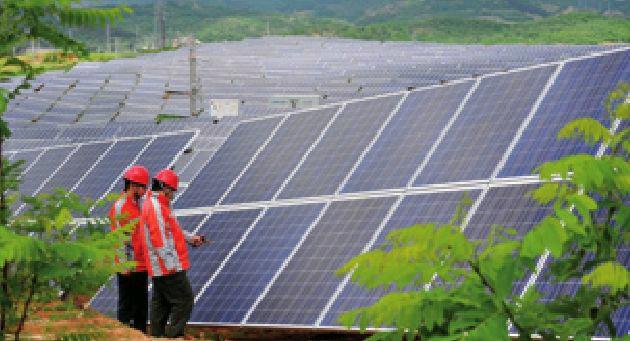Capacity for Greatness
2014-09-23ByZhouXiaoyan
By+Zhou+Xiaoyan
On the morning of August 21, Dong Wenbiao, a seasoned veteran of Chinas financial sector, stood upright in front of a skyscraper in Shanghai, looking more confident and ambitious than ever before.
The 57-year-old used to be Chairman of the Board of Chinas first national bank founded by private capital—China Minsheng Bank. Starting from scratch, he went on to make it one of the most profitable banks in China. Now, he has taken the helm of the largest private investment company, China Minsheng Investment(CMI), pledging to use the accumulated private investment to build an industrial and financial conglomerate.
Back in 1996, the availability of private capital in China was quite limited. Therefore, the proposed 5-billion-yuan ($814-million) registered capital for China Minsheng Bank was later scaled back to only 1.38 billion yuan ($225 million) owing to insufficient investment from private firms.
Flash forward, and two decades later, the landscape has dramatically changed. Burgeoning private investment now plays an increasingly bigger role in the broader economy. This time, it only took Dong less than two months to gather the 50-billion-yuan ($8.1-billion) registered capital for CMI. A total of 59 topnotch private companies became shareholders in the company.
Dong described CMIs vision: guiding private investment, gathering private capital and unleashing the vitality of private capital in Chinas institutional reform.
CMI plans to establish nine subsidiaries to help ease the problem of overcapacity, a chronic headache for such industries as steel, photovoltaic (PV) power generation and shipbuilding.
A breakthrough
The idea of CMI was first floated by Dong in May 2013 and was approved by the Central Government in April. It is expected to be a private version of China Investment Corp., the countrys $200-billion sovereign wealth fund.
The 59 shareholders of CMI are all large-sized private companies, with combined assets of nearly 1 trillion yuan ($163 billion). They are involved in a wide range of businesses including machinery manufacturing, metallurgy, information technology, assets management, environmental protection, new energy, power generation and e-commerce.
The establishment of CMI has arisen amid repeated promises from the Chinese Government since last November to allow the market to play a greater role in the economy.endprint
To this end, the Central Government has rolled out several reform measures this year, including opening more sectors to private investment, issuing licenses for private banks, greatly reducing the number of administrative items that require government approval and delegating more power to lower government levels.
“CMI will be an experiment not only for Chinas private sector but for the entire economy as well,” said Dong.
CEO Li Huaizhen said CMI would put an emphasis on Chinas domestic market, carefully choosing industries based on Chinas economic outlook and carrying out investment in projects deemed worthy.
Wang Jun, a senior economist with the China Center for International Economic Exchanges, a government think tank, said the founding of CMI will be important in stabilizing confidence and spurring private investment as the Chinese economy faces downward pressure.
For a long time, Chinas investment relied heavily on the Central Government and state-owned enterprises, which Wang said is unsustainable given increasing debt incurred by these enterprises and local governments.
“Restructuring of the Chinese economy calls for more private investment and for a bigger role to be played by private capital,”he said.
Zhu Zhenxin, a macroeconomic analyst with Minsheng Securities Co. Ltd., said one thing to watch is whether or not the founding of CMI will benefit small private companies.
“Owing to its massive scale, CMI will of course be interested in incorporating smaller projects. But through the integration of the industrial chain, the company will also be able to bring more opportunities to downstream industries and smaller private enterprises,” Zhu said.
The first task
CMI has pledged to attach top priority to the integration of industries long troubled by excess capacity, such as iron and steel, PV power generation, shipbuilding and energy sectors.
At present, China faces the arduous task of industrial transformation, with some sectors mired in overcapacity, especially traditional manufacturing industries.
In August, the Ministry of Industry and Information Technology released a list of companies whose outdated or excess capacity will be eliminated this year, covering 132 companies in 10 industries.
Taking the iron and steel industry for example, it has been in the red for 11 consecutive quarters and the rate of capacity utilization was less than 80 percent during the first half of 2014, according to data from the China Iron and Steel Association. “Now is the most difficult time for the industry since the reform and opening up in China that was launched more than three decades ago,” said Li Xinchuang, Executive Deputy Secretary-General of the association.endprint
However, analysts say realizing business integration in the beleaguered sector will be no easy task.
“If CMI wants to succeed in integrating the iron and steel sector, it needs to overcome four obstacles—the strictest environmental protection standards in history, a large amount of capital, a high-end talent pool and intertwined interest between local governments and businesses,” said Li.
In addition to the iron and steel industries, PV power generation is another sector targeted by CMI for business integration. CMI aims to become a top clean-energy provider in the country.
The PV industry has been dubbed the“engine of future energy revolution.” Although the manufacturing of PV components has developed China in recent years, the growth of its sister industry, PV power generation, in China has been comparatively slow.
Ren Haoning, a senior research fellow from China Investment Consulting Corp., said the PV industry is at a key stage of structural adjustment.
“Although the industry now faces many challenges, things will improve. The implementation of favorable loans and government subsidies will increase the profitability of PV power stations in China, thereby bringing about an overall recovery of upstream and downstream companies,” Ren said.
Ren also warned that overcapacity is more severe in the upstream and midstream of the PV industry.
“If CMI makes a foray into the component assembling sector recklessly, the PV business is likely to become more of a burden than an asset to them,” Ren warned.
Ever since CMI announced the top priority of the company, to integrate sectors with overcapacity, there have been widespread doubts over the decision. Some question whether CMI can ultimately turn a profit after buying those companies at fire sale prices.
Dong shrugged off those doubts, saying CMI will combine traditional financial concepts and capital operations with business integration, which represents the most profound difference between CMI and other industrial investment funds.
“Its a rich mine,” Dong said, referring to his companys planned integrations. “Some people just havent realized its potential value.”endprint
